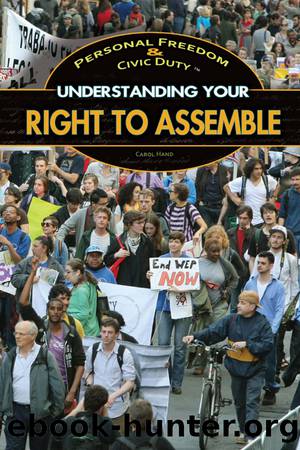Understanding Your Right to Assemble by Hand Carol;

Author:Hand, Carol; [Hand, Carol]
Language: eng
Format: epub
Publisher: Rosen Publishing Group
Congress of Racial Equality members gather in Washington, D. C., on May 4, 1961, to plan the Freedom Riders march to test segregation of bus terminal restaurants and restrooms in the South.
VIETNAM AND FREEDOM OF EXPRESSION
From 1964 through 1973, the United States fought the Vietnam War. The military draft was still in effect; all young men eighteen and over could be drafted against their will, sent to Vietnam, and potentially wounded or killedâfor a war many considered illegal and immoral. Protests, some violent, occurred around the country on high school and college campuses, before draft boards, and at political conventions. The most important court case involving freedom of assembly to arise from this era was brought on behalf of high school students. In Tinker v. Des Moines Independent Community School District (1969), the Supreme Court upheld studentsâ right to peaceably protest the war by wearing black armbands.
SCHOOLS AND THE FIRST AMENDMENT
In the Tinker case, the Supreme Court upheld studentsâ right to make a political statement within the school setting. But each case is decided on its own merits. School policy and separation of church and state also play important roles. In Bethel School District No. 403 v. Fraser (1986), student Matthew Fraser sued, citing the Tinker ruling, when he was punished for giving a student government nomination speech containing sexual references. The Supreme Court ruled against him, distinguishing between âpoliticalâ speech as represented by the armbands versus Fraserâs âvulgarâ speech. The Court ruled that the school had the right to protect the underage student body from vulgar and offensive speech.
Several recent rulings deal with the right of students to form religious clubs on school property. These clubs are expressions of freedom of assembly, protected under the Federal Equal Access Act (1984). This act allows student-led noncurricular groups to meet on school property. It was passed at the urging of conservative Christian groups, which wanted to hold prayer meetings and Bible study groups. Largely because of this law, the number of Christian Bible clubs in public schools rose from one hundred in 1980 to fifteen hundred in 1995. But the law applies equally to all noncurricular groups; for example, students might meet to discuss atheism, goth culture, heavy metal music, or more recently, LGBT issues. One court case dealing with this law was Board of Education of Westside Community School v. Mergens (1990). Bridget Mergens sued to obtain permission to start a Christian club at her school. The Court ruled that the club could be allowed on the same basis as other student-led clubs and that this represents equal treatment, not school endorsement of religion.
Bridget Mergens Mayhew and her attorney, Douglas Veith, leave the Supreme Court on January 8, 1990. She sought the right to hold a Christian Bible study group in Westside High School, in Nebraska.
Download
This site does not store any files on its server. We only index and link to content provided by other sites. Please contact the content providers to delete copyright contents if any and email us, we'll remove relevant links or contents immediately.
Pale Blue Dot by Carl Sagan(4989)
Cracking the GRE Premium Edition with 6 Practice Tests, 2015 (Graduate School Test Preparation) by Princeton Review(4266)
Pocahontas by Joseph Bruchac(4232)
Unfiltered by Lily Collins(3999)
The Emotionary: A Dictionary of Words That Don't Exist for Feelings That Do by Eden Sher(3347)
The Daily Stoic by Holiday Ryan & Hanselman Stephen(3290)
Factfulness_Ten Reasons We're Wrong About the World_and Why Things Are Better Than You Think by Hans Rosling(3226)
The 48 laws of power by Robert Greene & Joost Elffers(3210)
The Innovators: How a Group of Hackers, Geniuses, and Geeks Created the Digital Revolution by Walter Isaacson(3119)
The President Has Been Shot!": The Assassination of John F. Kennedy by Swanson James L(3083)
Sapiens and Homo Deus by Yuval Noah Harari(3054)
Rogue Trader by Leeson Nick(3037)
Gettysburg by Iain C. Martin(2823)
The Rape Of Nanking by Iris Chang(2805)
Almost Adulting by Arden Rose(2691)
The Plant Paradox by Dr. Steven R. Gundry M.D(2599)
In the Woods by Tana French(2579)
500 Must-Know AP Microeconomics/Macroeconomics Questions(2554)
Make by Mike Westerfield(2316)
